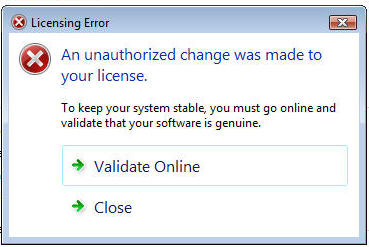Vista WGA problems confirmed

This morning I reported on Vista activation and validation problems I've been hearing and reading about in the last few weeks. This afternoon I have a firsthand report.
When I installed a beta version of Acclaim's 9Dragons role-playing game (protected, apparently, by nProtect's GameGuard anti-cheating software), Vista dropped a bomb on me. A time bomb, that is. The software convinced the Windows Software Licensing service that the operating system was being tampered with, deactivating the system and starting a 72-hour countdown to "reduced functionality mode." This image gallery documents the process:
I'm baffled that this Windows error message doesn't actually mention Windows. It just says "your license" and "your software." How am I supposed to know which license and which software. And in the left-hand-meet-right-hand department, where's Windows Defender in all this? I'm installing a piece of software that is tampering with my operating system, according to the Windows Software Licensing module. So why is Windows Defender looking the other way while this dastardly deed is being done? Why doesn't it detect and block this software?
In this case, closing the game and restarting the computer allowed me to reactivate over the Internet, but other people haven't been so lucky, based on reports filed at Microsoft's Vista Validation Issues forum.
For the record, I think Acclaim deserves a share of the blame for this problem. This problem has been known for a month, maybe much longer. When I installed the 9Dragons software today, it auto-updated itself to the latest version. Supposedly, nProtect has had a patch available for some time, so why doesn't Acclaim include it?
Still, shifting the blame around is cold comfort to a Windows user who downloads and installs a perfectly innocent-looking program only to discover that they've actually pulled the pin on a grenade that will go off in 72 hours unless it's disarmed.
So far, it looks like most of these problems respond to simple treatment: uninstall the game or program and reactivate, by phone if necessary. Still, it's a hassle to deal with, and nontechnical users are likely to be thoroughly confused.
I was fortunate enough not to reach "reduced functionality mode." Adrian Kingsley-Hughes has an excellent image gallery showing exactly what that looks like. (Hint: not fun.)
I'm still waiting for a response from Microsoft.
Update 27-Feb-2007: Microsoft's David Lazar, Director of the Genuine Windows program, says a technical team is investigating this issue now. A Knowledge Base article on the subject (931699) was published on February 21 acknowledging the existence of the problem and listing options for fixing the damage. I'll be speaking with him and others later this week and will post a follow-up then.
